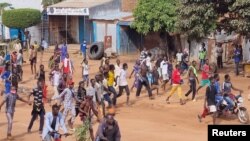The government of Chad says at least 50 people were killed and more than 300 injured after security forces opened fire on protesters demanding an end to military rule. The government described the protests as an armed insurrection.
Chad’s transitional government imposed a dawn-to-dusk curfew in the capital N'Djamena and three other towns late Thursday as it attempts to manage the unrest.
Protesters took to the streets Thursday demanding an end to the current government, which has extended its mandate for another two years. Security forces opened fire, killing 50 people and injuring 300.
Prime Minister Saleh Kebzabo blamed the deaths on the protesters and banned public gatherings.
He said the transitional government that I lead, following the extremely serious abuses experienced this morning, has taken the following precautionary measures: to impose a curfew from 6:00 p.m. to 6:00 a.m. until order is fully restored in N'Djamena, Moundou, Doba and Koumra.
The prime minister also declared a suspension of public activity by all political parties and civil society organizations, mentioning the Transformers party, the Socialist Party Without Borders, and the Wakit Tamma party. He said protesters may be prosecuted for the deaths, theft of weapons, and the destruction of public buildings and vehicles.
Lewis Mudge, Central Africa director for Human Rights Watch, said an investigation is needed to know how the protestors were killed.
“It’s clear that an impartial investigation is going to be needed to determine whether according to the prime minister, protestors did resort to violence”, said Mudge. “But more importantly, to determine whether the security forces unlawfully resorted to lethal force across the country. So, an independent investigation into all responsible parties which includes officials regardless of their ranks, is going to be critical to determine accountability for the loss of life but also to determine that the use of force was only used as a last resort."
Chad’s former prime minister and the African Union Commission Chairperson Moussa Faki condemned the crackdown on demonstrators and called for a peaceful solution to the political crisis.
Mudge says military leaders need to give up power to contain any unrest.
“So, I think it will be very important for the transitional committee to move towards civilian rule as quickly as possible and not to continue to prolong this military rule”, said Mudge. As it's now, we are facing quite a long time before we get any deadline for civilian rule and so we can anticipate further protests along the lines which we have seen yesterday. I think the big question is, will there be a continuing response by the security forces that we saw yesterday.”
Last week, Chad’s military leader and interim president Mahamat Idriss Deby appointed opposition leader Kebzabo as prime minister for a transitional unity government, which is slated to run the country's affairs for the next two years.
The 38-year-old Deby took power following the death of his father Idriss Deby who was killed fighting rebels in northern Chad in April 2021.
The younger Deby said he would restore civilian rule after 18 months. That period was supposed to end Thursday.




